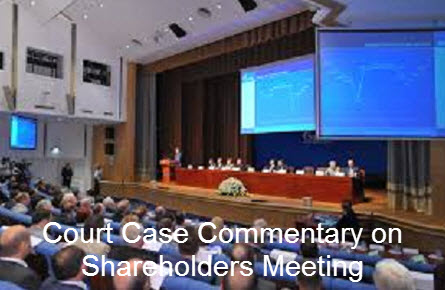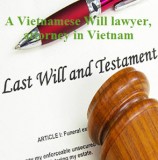A resolution may be declared invalid and revoked, if it have not been conducted properly as required by law
Court case commentary: A resolution may be declared invalid and revoked by Vietnamese Court, if it have not been conducted properly as required by Vietnamese law.
Post date: 19-07-2014
5,065 view(s)
Look at the court case commentary of Welding Technology and Equipment Company v. Thanh Xuan Passenger Transportation Join Stock Company, Ha Noi People’s Court case from 2006 involving formalities to approve a sale of shares. The Extraordinary General Meeting had not been conducted properly as required by law. Its resolution was declared invalid and revoked by the Court.

A resolution may be declared invalid and revoked by Vietnamese Court, if it have not been conducted properly as required by Vietnamese law
This is a case No 122/2006/TLST-KDTM which was brought to the Ha Noi City People’s Court for trial. The case was accepted by the Court on 30th November 2006, decided to bring to trial on 19th December 2006 and was heard before the trial court during two days -10th and 15th of May 2007. Judgment No.52/2007/KDTM-ST was handed down as follows:
The Facts of Court Case Commentary
In this case, Thanh Xuan Company (the Company), the defendant, used to be a state owned enterprise and converted into a joint stock company in 1999. In April 2004, the general shareholders’ meeting of the Company passed a resolution to increase its charter capital from VND5.5 billion to VND8 billion. However, the general shareholders’ meeting did not decide the classed of chares and total number of shares in each of class to be offered. In early January 2005, the Board of Management and General Director of the Company decided, without informing the shareholders, to sell 25,000 shares to a numbers of buyers, including the Welding Technology and Equipment Company. The plaintiff in this case bought 10,000 shares. This sale of shares (Share sale) was subsequently ratified by the general shareholders’ meeting of the Company by the Resolution No.11/HDQT passed on 07 April 2005. The name of the plaintiff was dully entered in the records of the Company as a shareholder. Since then, the plaintiff has participated in voting in general shareholders’ meeting and nominating members of the Board of Management of the Company.
Apparently, some shareholders were not happy with the Share Sale and the way the plaintiff participated in the affairs of the Company. This led to an extraordinary general shareholders’ meeting which took place on 9 November 2006 (Extraordinary General Meeting) to review the Share Sale. In the Extraordinary General Meeting, the shareholders passed Resolution No.186/HDQT to revoke the allegedly unlawful Share Sale to the plaintiff. It is the validity of this Resolution (Resolution 186) that lies at the heart of this litigation.
On 30 November 2006, the plaintiff initiated the lawsuit at the Ha Noi City People’s Court initially seeking an order that Resolution 186 be revoked and a declaration that the Share Sale was valid. However, before the trial, the request for the declaration was withdrawn and the plaintiff only maintained its application for order that Resolution No.186 be revoked.
The arguments of court case commentary
The ground of plaintiff’s application is that the Extraordinary General Meeting and its voting process were not conducted in accordance with the Law on Enterprises 2005 and the Charter of the Company. In particular, the plaintiff alleged that:
1. the vote counting committee was only appointed by the Chairman, rather than approved by the general shareholders’ meeting as required by law;
2. there were inaccuracies in counting the votes;
3. the number of shares held by the plaintiff was not accurately recorded in the voting cards;
4. the voting percentage was calculated on the basis of the previous capital of the Company being VND5.5 billion, while its real charter capital at this time was VND8,8 billion; and
5. The general shareholders’ meeting did not have the power to revoke the Share Sale.
The Company, as the defendant, responded that it was improper for the Board of Management and General Director to decide the Share Sale because the general shares’ meeting had not approved the classes of shares and the number of shares in each class to be offered. Therefore, according to the defendant, Resolution 186 to revoke the Share Sale was necessary to protect the legitimate interests of shareholders. Secondly, the defendant denied that the vote counting committee was not approved by the general shareholders’ meeting; thirdly, the defendant argued that Resolution 186 was valid and lawful because it was passed with a 65% vote, given, in particular, that the current charter of the Company only required 51% vote for such resolution.
The Decision of the Judge
The Court found in favor of the plaintiff on the ground that the Extraordinary General Meeting had not been conducted properly as required by law. In particular, the Court pointed out the following irregularities:
1. At the Extraordinary General Meeting, the Chairman recommended two secretaries to take minutes while Article 103(2)(c) of Law on Enterprise 2005 provides that the Chairman shall appoint one person to act as the secretary to take minutes. In addition, Clause 14.8 of the Charter of the Company states that “those attending the meeting shall elect a secretary to take minutes…”. Therefore, appointment of the secretary should have been approved by all shareholders in attendance. This was not done. Hence, the appointment of two secretaries without the approval of the shareholders was an irregularity in breach of the Charter of the Company and the Law on Enterprises.
2. The second irregularity the Court pointed out was that the vote counting committee was appointed by the Chairman and not approved the General Shareholders Meeting as required by Article 103 (2)(d) of the Law on Enterprises 2005. Additionally, the vote counting committee reported that there were seven abstentions while the plaintiff produced at the hearing 11 voting cards which had not been put in the vote box. Thus, the Court concluded that there had been inaccuracies in the vote counting process, and
3. The voting process stipulated in Article 103(5) of the Law on Enterprise 2005 is to collect the “agreed” votes first before collecting the “disagreed” votes. Then, the “agreed” and “disagreed” votes shall be counted to arrive at the outcome. The Court observed that in the Extraordinary General Meeting, the Company only gave the shareholders a voting card on which the shareholders were asked to cross out either “agreed” or “disagreed” as appropriate. The Court concluded that the voting process had not been conducted as required by Law on Enterprises and this was irregularity in conducting the Extraordinary General Meeting.
On that basis, the Court found that the Extraordinary General Meeting and its voting process was not conducted properly as required by the law. Therefore, Resolution 183 was invalid and was revoked. Judgment was given for the plaintiff with costs against defendant, the Company.
Court Case Commentaries
The Extraordinary General Meeting had not been conducted properly as required by law. Its resolution may be declared invalid and revoked by the Court. Therefore, in conducting general shareholders’ meeting or other corporate affairs, it is essential to follow strictly the provisions of Law on Enterprise. Any deviation may give to the risk that a resolution may be declared invalid, notwithstanding such deviation may be immaterial and have not real consequences.
However, the Court missed some points as follows:
- The Court could have found that Resolution 186 was invalid because the new Law on enterprise now requires a 75% vote for such resolution and the Charter must comply with the new law.
- The Court could have found that Resolution 186 was invalid because the Share Sale had already been approved by the general shareholders’ meeting on 7 April 2005 and, perhaps, the general shareholders’ meeting should not be allowed to pass a new resolution revoking a previous valid resolution selling shares to third parties.
Lawyervn.net














Send your comment